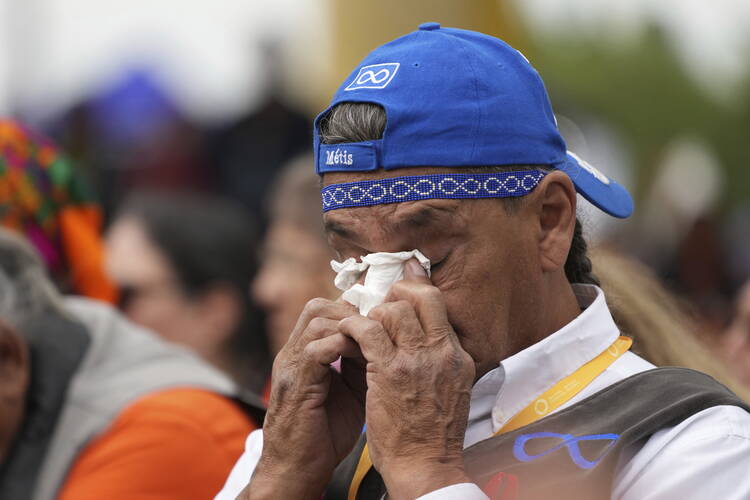MASKWACIS, Alberta (AP)—Pope Francis’ apology Monday for the Catholic Church’s role in Canada’s residential school system and the abuses that took place within it was a full-throated denunciation of a decades-long policy of forced assimilation that aimed to strip Indigenous children of their culture and traumatized generations.
Speaking at the site of a former residential school south of Edmonton, Alberta, the pontiff said he was “deeply sorry” for actions by many in support of “the colonizing mentality of the powers that oppressed the Indigenous peoples.”
He also expressed sorrow over the schools’ systemic marginalization, denigration and suppression of Indigenous people, languages and culture; the “physical, verbal, psychological and spiritual abuse” children suffered after being taken from their homes at a young age; and the “indelibly” altered family relationships that resulted.
“Every time he said the word sorry, people would start applauding.”
“I myself wish to reaffirm this, with shame and unambiguously. I humbly beg forgiveness for the evil committed by so many Christians against the Indigenous peoples,” Francis said.
Here are some reactions to the pope’s remarks:
___
“It was an achievement on the part of the Indigenous community to convince Pope Francis to come to a First Nation community and humble himself before survivors in the way he did today. It was special. And I know that it meant a lot to a lot of people. And every time he said the word sorry, people would start applauding,” Phil Fontaine, a residential school abuse survivor and former chief of the Assembly of First Nations, said in an interview with The Associated Press.
“I’ve waited 50 years for this apology, and finally today I heard it.”
___
“We may all need time to fully absorb the gravity of this moment. ... If you want to help us heal, stop telling us to get over it. ... We can’t get over it when intergenerational trauma impacts every youth and every member, every family who had a residential school survivor. Instead of getting over it, I’m asking you to get with it, get with learning about our history, get with learning about our culture, our people, who we are,” Chief Desmond Bull of Louis Bull Tribe said during a news conference.
___
It “was validation that this really happened” for the apology to be heard by non-Indigenous people, Chief Tony Alexis of the Alexis Nakota Sioux Nation said, but the pope needs to follow up with action and “can’t just say sorry and walk away.”
___
“I’ve waited 50 years for this apology, and finally today I heard it,” Evelyn Korkmaz, a school survivor, said during a news conference. Unfortunately many family and community members did not live to see it due to suicide or substance-abuse, she said. But “I was hoping to hear some kind of work plan” for ways the church would be turning over documents and taking other concrete steps.
“Words cannot describe how important today is for the healing journey for a lot of First Nations people.”
___
“I have a lot of survivors and thrivers in my community who are happy to hear the pope has come to apologize. Words cannot describe how important today is for the healing journey for a lot of First Nations people,” Chief Vernon Saddleback of Samson Cree Nation said in a news conference. “The pope apologizing today was a day for everyone in the world to sit back and listen.”
___
“It’s something that is needed, not only for people to hear but for the church to be accountable,” said Sandi Harper of Saskatoon, Saskatchewan, who attended the papal event in honor of her late mother, a former residential school student. Still, she told AP some Indigenous people are not ready for reconciliation: “We just need to give people the time to heal. It’s going to take a long time.”








